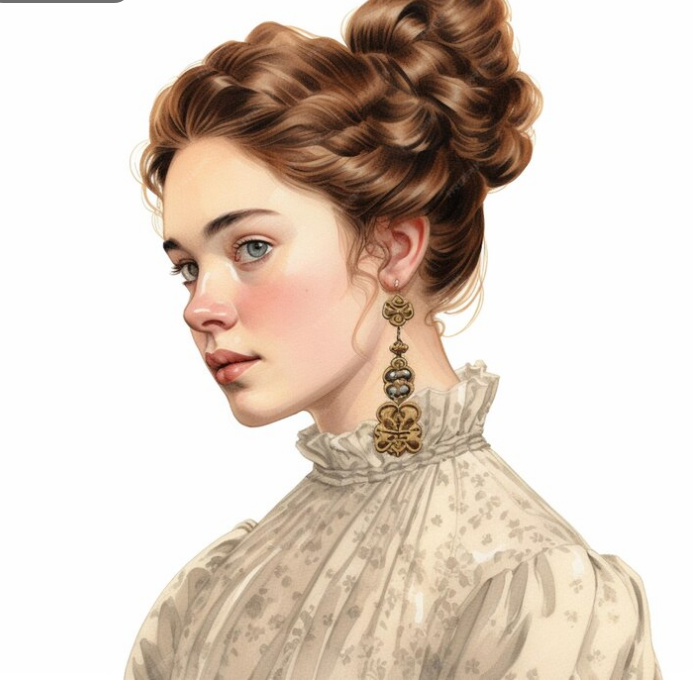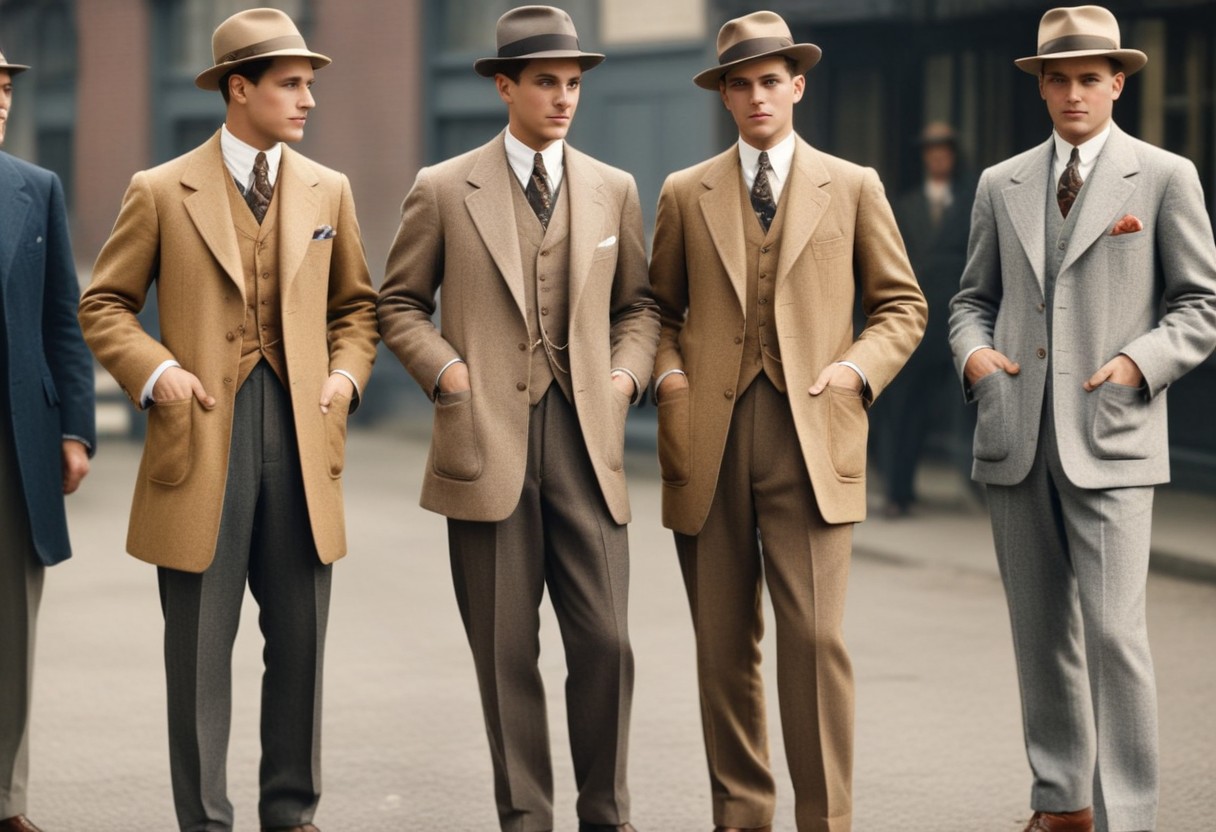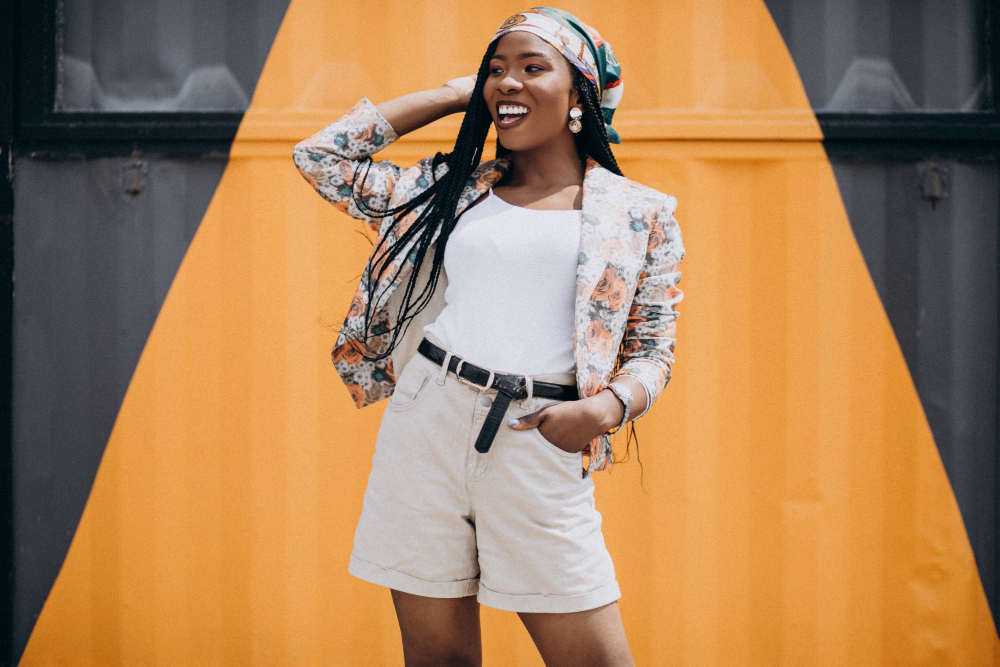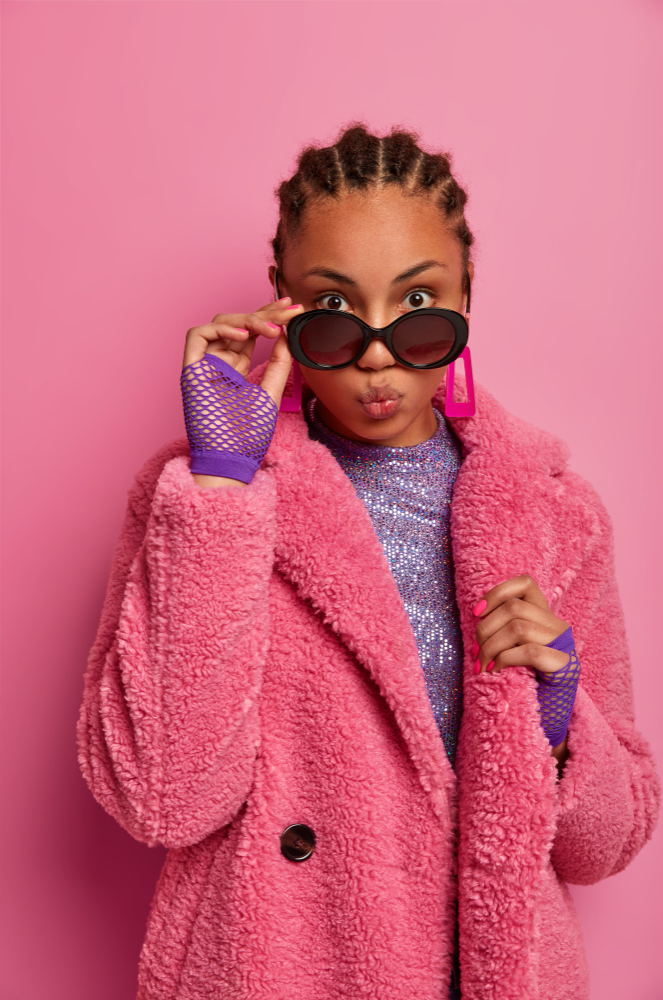The New Age of 90s Black Women’s Fashion
90s Black Womens fashion was diverse and influenced by a variety of inspirations, including pop culture, music, film, and socioeconomic shifts. 90s Black Womens fashion was diversified, vibrant, and representative of the era’s cultural influences and trends. It incorporated streetwear, athleticism, African-inspired features, and bright statement pieces, resulting in a varied spectrum of designs for Black women to express themselves in.
The following are the most prominent trends from that era:
Crop Tops and High-Waisted Bottoms: Crop tops with high-waisted bottoms were a prominent fashion trend in the 1990s. This style highlighted midriffs and was frequently seen in music videos and films starring black singers and actresses.
Streetwear: Streetwear became highly fashionable among Black women during the 1990s. This look frequently featured oversized apparel, such as baggy trousers, giant T-shirts or sweatshirts, and sneakers. Brands such as FUBU, Karl Kani, and Cross Colours were very popular among the Black population.
Athletic Clothing: As hip-hop culture gained popularity, athletic clothing became an important aspect of 90s Black Women’s fashion. This included tracksuits, windbreakers, and footwear from popular brands like Nike, Adidas, and Reebok.
Bold Prints: African-inspired prints and bright colors were popular in 90s Black Womens fashion. Dashikis, kente cloth, and other traditional African materials were used to create dresses, skirts, and tops that reflected a celebration of cultural history.
Denim: For Black women in the 1990s, denim was a wardrobe essential. This consisted of denim jackets, overalls, skirts, and dresses. Distressed and acid-washed denim were particularly fashionable trends of that era.
Unique Accessories: 90s Black Women’s fashion was heavily influenced by unique accessories. Chunky hoop earrings, bamboo earrings, door-knocker earrings, nameplate necklaces, and giant sunglasses were popular options. Additionally, headwraps, bandanas, and bucket hats were popular accessories that gave appealing flair to clothing.
Minimalist Chic: While the 1990s saw a lot of flamboyant and flashy fashion trends, Aaliyah and Janet Jackson championed a minimalist style. This style included sleek, monochromatic clothes (often in neutral tones) along with basic yet attractive accessories.
Latest 90s Black Womens Fashion Trends Still Alive in 2024
It goes without saying that fashion trends are often cyclical, with styles from previous decades seeing resurgence and reinterpretation. In recent years, some 90s Black Women’s fashion styles have resurfaced or been reinterpreted in new ways. Some of these 1990s fashion trends entail:
Tube Tops:
Tube tops (along with crop tubes) were fashionable in the 1990s and have made a comeback in recent years, particularly when coupled with high-waisted trousers. These tops have made a comeback, particularly in fitted and ribbed styles.
Baggy Jeans:
Baggy jeans were a hallmark style of 90s hip-hop fashion and have resurfaced as looser-fitting denim becomes more popular. For a more balanced profile, try this style with crop tops, bodysuits, or fitted tops.
Chunky Sneakers:
Chunky sneakers, popularly known as “dad shoes,” were a defining feature of 1990s footwear. Brands are releasing revamped versions of classic sneakers with enlarged soles and chunky designs, reintroducing them as a fashion staple.
Slip Dresses:
Slip dresses were popular in the 1990s as an adaptable and basic wardrobe staple. They’ve made a reappearance in recent years, especially when layered over T-shirts or coupled with clunky sneakers for a modern take on the grunge-inspired look.
Sportswear:
90s Black Women’s fashion witnessed the birth of sportswear, which is defined by athletic and comfortable apparel suitable for both workouts and casual outings. This trend has remained popular, with brands selling trendy activewear items like leggings, sports bras, and oversized sweatshirts.
Hair Accessories:
When it comes to 90s Black Womens fashion, scrunchies, headbands, and butterfly clips were the most popular hair accessories. These accessories are regaining popularity, with modern renditions incorporating vibrant colors, ornaments, and whimsical designs.
Tracksuits:
Tracksuits were a staple of 90s Black Women’s fashion streetwear and remain a highly popular fashion trend today. Both vintage-inspired and contemporary tracksuit outfits are popular, providing a comfortable and fashionable alternative for everyday wear.
Fashion Icons of the 90s Black Womens Fashion
In the 1990s, some notable Black women emerged as fashion icons, shaping trends and leaving an indelible mark on the industry. These women not only displayed different and unique looks but also used their platforms to challenge traditional norms and conventions and redefined beauty standards in the fashion business, creating a lasting impact on 90s Black Womens fashion.
Some noteworthy fashion icons of 90s Black women’s fashion are:
Aaliyah:
Aaliyah’s effortlessly cool style mixed tomboyish traits with feminine touches, establishing her as a 90s fashion star. She frequently wore crop tops, baggy jeans, large coats, and sleek sunglasses, which influenced streetwear and urban fashion trends.
Janet Jackson:
Janet Jackson’s effect on 90s Black Womens fashion went beyond her musical career. With her daring and provocative style, Jackson pushed boundaries and established trends with her dramatic theatrical outfits, distinctive hairstyles, and edgy streetwear appearances.
Naomi Campbell:
Naomi Campbell was a well-known supermodel in the 1990s and a style icon both on and off the runway. Campbell’s elegant yet edgy style popularized slim slip dresses, body-conscious silhouettes, and striking accessories.
Tyra Banks:
Tyra Banks rose to prominence as a supermodel in the 1990s, noted for her commanding runway presence and immaculate sense of style. She embraced body-conscious styles, elegant evening gowns, and eye-catching accessories, solidifying her reputation as a fashion star.
Lisa Bonet:
Known for her bohemian-chic style, Lisa Bonet radiated a relaxed and diverse attitude in the 1990s. She embraced vintage-inspired outfits, seamlessly combining materials, designs, and layers, inspiring a generation of free-spirited fashionistas.
TLC:
TLC members were not only important in music but equally popular in the fashion industry as well. TLC, known for their flamboyant and varied style, popularized large overalls, colorful and unusual outfits, and eye-catching accessories, pushing the boundaries of both music and fashion.
Brandy Norwood:
Brandy’s portrayal as Moesha on the popular TV program “Moesha” made her a style icon for many young Black women in the 1990s. Her character’s fashion sense, which included fashionable streetwear, oversized denim, and whimsical accessories, echoed prevailing fashion trends of the time.
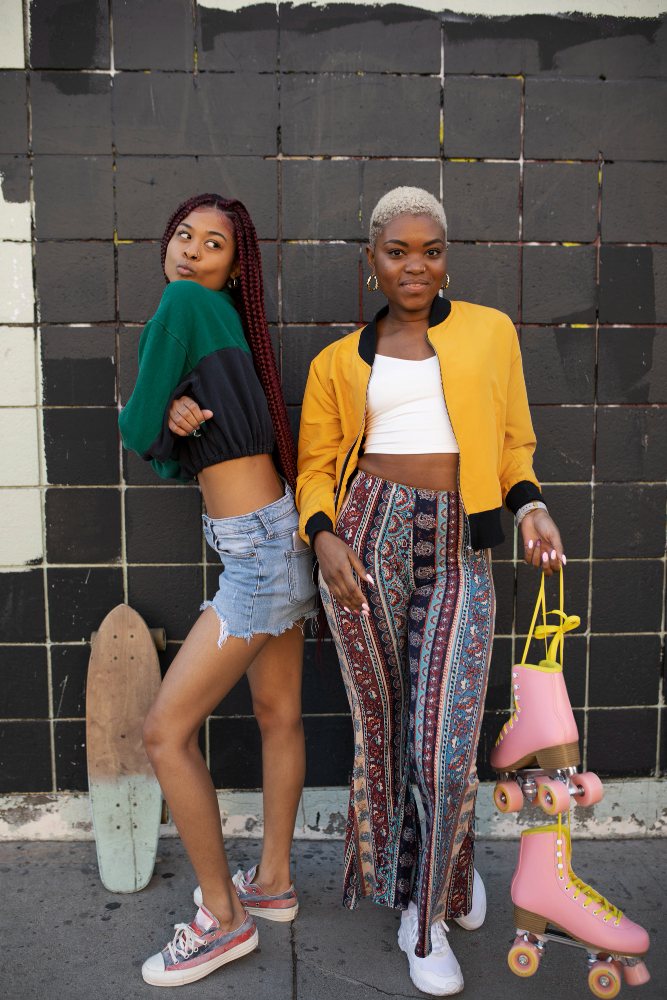

How 90s Black Women’s Fashion Influenced Today’s World?
90s Black women’s fashion continues to have a huge impact on today’s fashion scene, providing inspiration, inventiveness, and cultural relevance. Its influence can be seen in the continued popularity of streetwear, athleisure wear, minimalist aesthetics, bold prints, and the resurgence of vintage designs, all of which add to the diverse and dynamic terrain of modern fashion. 90s Black women’s fashion has had a big and enduring influence on today’s fashion industry in a variety of ways, such as:
Vintage Style Revival:
As interest in vintage fashion has grown, iconic styles and companies from the 1990s have been revived. Slip dresses, loose jeans, crop tops, and tracksuits worn by black women in the 1990s are gaining favor among modern fashion fans, influencers, and designers.
Streetwear and Urban Fashion:
The 1990s saw the birth of streetwear and urban fashion, both largely influenced by Black culture and style. Black entrepreneurs developed brands like FUBU, Karl Kani, and Cross Colours, which had a significant impact on the streetwear aesthetic. Streetwear is still a major force in fashion today, having roots deep in the urban fashion scene of the 1990s.
Celebration of Black Culture:
The 90s Black Womens fashion was a representation of their culture, inventiveness, and endurance. Black fashion’s cultural significance and contributions to mainstream fashion are now more widely recognized. Black designers, models, and influencers help shape fashion trends and challenge industry norms.
Minimalist Aesthetics:
The minimalist aesthetic that defined 1990s fashion, with clean lines, uncomplicated silhouettes, and neutral color palettes, continues to impact modern style. Black women in the 1990s embraced minimalist outfits that emanated refinement and understated elegance, paving the way for minimalist fashion trends that still exist today.
Athleisure Wear:
The popularity of athleisure wear, which effortlessly integrates sports attire with everyday clothing, dates back to the 1990s. Black women, in particular, embraced sports fashions that valued comfort and functionality while maintaining style. This trend has spread worldwide, with athleisure apparel becoming a wardrobe standard.
Is 90s Black Women’s Fashion Still Alive in the 21st Century?
Yes, 90s Black Womens fashion continues to impact contemporary style trends and is still dynamic and relevant in today’s fashion scene. While fashion changes over time, many aspects of 90s Black women’s fashion have endured and been reinvented in modern situations. Furthermore, nostalgia for the 1990s has resulted in a renewed interest in the decade’s fashion, with designers, influencers, and consumers embracing famous styles and trends from that era. Some features of 90s Black womens fashion are still alive and relevant, including streetwear influences, minimalist silhouettes, bold prints and colors, athleisure wear, unique accessories and ornaments, distinctive hairstyles, and a revival of iconic brands and styles.
It can be concluded that, while fashion trends come and go, the influence of 90s Black womens fashion can still be felt in today’s fashion scene, acting as a source of inspiration and innovation for designers, influencers, and fashion enthusiasts all over the world.

